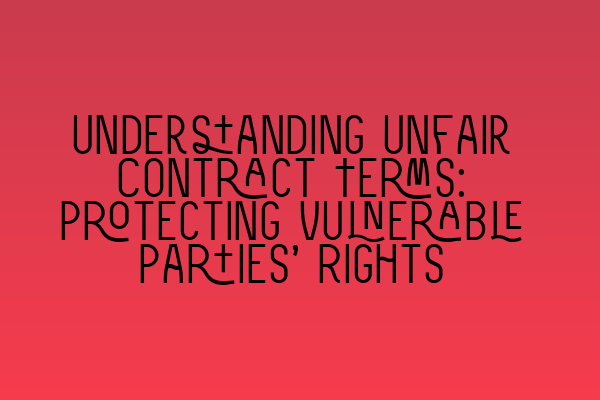Understanding Unfair Contract Terms: Protecting Vulnerable Parties’ Rights
In today’s complex commercial world, contracts play a vital role in governing business relationships and transactions. However, not all contract terms are fair and reasonable, which can put vulnerable parties at a significant disadvantage. Understanding unfair contract terms is crucial to protect the rights of these vulnerable parties and maintain a fair and just legal system.
What are Unfair Contract Terms?
Unfair contract terms refer to terms and conditions in a contract that are considered to be one-sided, oppressive, or highly prejudicial towards one party. These terms typically provide an unequal distribution of rights and obligations, favoring the stronger and more dominant party. They can be found in various types of contracts, including business contracts, consumer agreements, employment contracts, and tenancy agreements.
The Consequences of Unfair Contract Terms
Unfair contract terms can have severe consequences for vulnerable parties who may lack the negotiating power or knowledge to fully comprehend their implications. These terms can lead to an imbalance in the contractual relationship, undermining the vulnerable party’s ability to protect their interests and enforce their rights. They can result in financial loss, restricted access to justice, and limited recourse in case of breach or dispute.
Legislation Protecting Vulnerable Parties
To address the issue of unfair contract terms, legislation has been put in place in many jurisdictions to safeguard the rights of vulnerable parties. In the UK, the Consumer Rights Act 2015 provides specific protections against unfair terms in consumer contracts. These protections include a requirement for terms to be transparent and written in plain language, a prohibition on terms that unfairly limit a consumer’s rights, and a provision for remedies in case of unfair terms.
Implications for Businesses and Organizations
Understanding and complying with the legislation surrounding unfair contract terms is essential for businesses and organizations to avoid legal consequences and maintain a positive reputation. Incorporating fair and reasonable terms into contracts protects both parties, enhances trust, and promotes good business practices. It is crucial for businesses to conduct regular reviews of their contract terms, ensuring they are in line with legal requirements and industry standards.
Seeking Legal Advice
For vulnerable parties entering into contracts, seeking legal advice is crucial to ensure their rights and interests are protected. Contract law is complex, and professional legal guidance can help identify any unfair terms and negotiate for fairer contractual arrangements. Engaging a solicitor who specializes in contract law will provide the expertise needed to navigate the intricacies of contract terms and ensure fairness in the contractual relationship.
Protecting Vulnerable Parties’ Rights
Protecting the rights of vulnerable parties in contract law is not only a legal obligation but also a moral and ethical responsibility. Fair and reasonable contracts are the backbone of a just and equitable society. By actively advocating for fairness and actively working to eliminate unfair contract terms, we can create an environment that fosters mutual respect, equal bargaining power, and robust protection of individual and consumer rights.
To learn more about SQE and contract law, check out these related articles:
– SQE 1 Practice Exam Questions
– SQE 1 Practice Mocks FLK1 FLK2
– SQE 2 Preparation Courses
– SQE 1 Preparation Courses
– SRA SQE Exam Dates
At SQE Contract Law, we are dedicated to promoting fairness and protecting the rights of vulnerable parties. Contact us today for expert legal advice and assistance in navigating the complexities of contract law.
